人教版九年级英语Unit10知识点总结
Unit10知识重点总结 人教版新目标 英语九年级全册
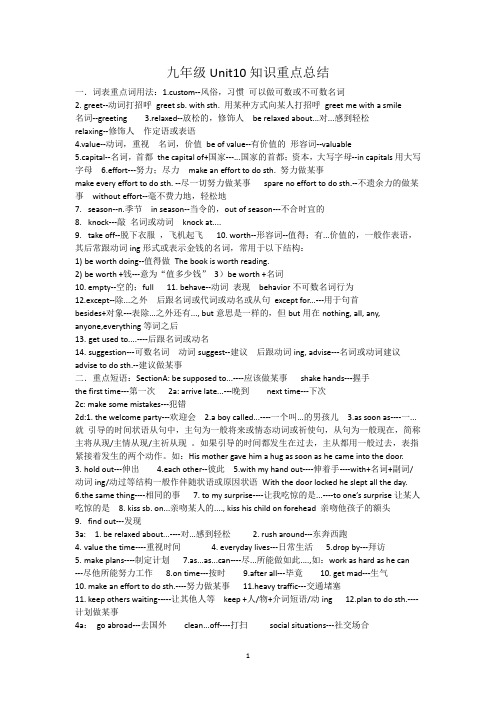
九年级Unit10知识重点总结一.词表重点词用法:1.custom--风俗,习惯可以做可数或不可数名词2.greet--动词打招呼greet sb. with sth. 用某种方式向某人打招呼greet me with a smile名词--greeting 3.relaxed--放松的,修饰人be relaxed about...对...感到轻松relaxing--修饰人作定语或表语4.value--动词,重视名词,价值be of value--有价值的形容词--valuable5.capital--名词,首都the capital of+国家---...国家的首都;资本,大写字母--in capitals用大写字母6.effort---努力;尽力make an effort to do sth. 努力做某事make every effort to do sth. --尽一切努力做某事spare no effort to do sth.--不遗余力的做某事without effort--毫不费力地,轻松地7.season--n.季节in season--当令的,out of season---不合时宜的8.knock---敲名词或动词knock at....9.take off--脱下衣服,飞机起飞10. worth--形容词--值得;有...价值的,一般作表语,其后常跟动词ing形式或表示金钱的名词,常用于以下结构:1)be worth doing--值得做The book is worth reading.2)be worth +钱---意为“值多少钱”3)be worth +名词10.empty--空的;full 11. behave--动词表现behavior不可数名词行为12.except--除...之外后跟名词或代词或动名或从句except for...---用于句首besides+对象---表除...之外还有..., but意思是一样的,但but用在nothing, all, any, anyone,everything等词之后13.get used to....----后跟名词或动名14.suggestion---可数名词动词suggest--建议后跟动词ing, advise---名词或动词建议advise to do sth.--建议做某事二.重点短语:SectionA: be supposed to...----应该做某事shake hands---握手the first time---第一次2a: arrive late...---晚到next time---下次2c: make some mistakes---犯错2d:1. the welcome party---欢迎会 2.a boy called...----一个叫...的男孩儿 3.as soon as----一...就引导的时间状语从句中,主句为一般将来或情态动词或祈使句,从句为一般现在,简称主将从现/主情从现/主祈从现。
人教版九年级英语全册Unit10知识点
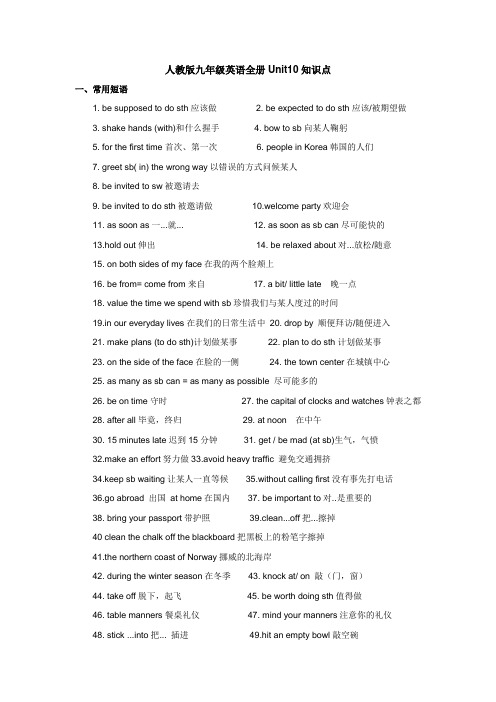
人教版九年级英语全册Unit10知识点一、常用短语1. be supposed to do sth应该做2. be expected to do sth应该/被期望做3. shake hands (with)和什么握手4. bow to sb向某人鞠躬5. for the first time首次、第一次6. people in Korea韩国的人们7. greet sb( in) the wrong way以错误的方式问候某人8. be invited to sw被邀请去9. be invited to do sth被邀请做10.welcome party欢迎会11. as soon as一...就... 12. as soon as sb can尽可能快的13.hold out伸出14. be relaxed about对...放松/随意15. on both sides of my face在我的两个脸颊上16. be from= come from来自17. a bit/ little late 晚一点18. value the time we spend with sb珍惜我们与某人度过的时间19.in our everyday lives在我们的日常生活中20. drop by 顺便拜访/随便进入21. make plans (to do sth)计划做某事22. plan to do sth计划做某事23. on the side of the face在脸的一侧24. the town center在城镇中心25. as many as sb can = as many as possible 尽可能多的26. be on time守时27. the capital of clocks and watches钟表之都28. after all毕竟,终归29. at noon 在中午30. 15 minutes late迟到15分钟31. get / be mad (at sb)生气,气愤32.make an effort努力做33.avoid heavy traffic 避免交通拥挤34.keep sb waiting让某人一直等候35.without calling first没有事先打电话36.go abroad 出国at home在国内37. be important to对..是重要的38. bring your passport带护照39.clean...off把...擦掉40 clean the chalk off the blackboard把黑板上的粉笔字擦掉41.the northern coast of Norway挪威的北海岸42. during the winter season在冬季43. knock at/ on 敲(门,窗)44. take off脱下,起飞45. be worth doing sth值得做46. table manners餐桌礼仪47. mind your manners注意你的礼仪48. stick ...into把... 插进49.hit an empty bowl敲空碗50. point at指着, point to指向(侧重方向51. at the table在餐桌旁52 at table在吃饭53.basic table manners基本的餐桌礼仪54. my biggest challenge我最大的挑战55. on my student exchange program在我的交换生生56.there is no reason to do sth没原因做57. go out of one’s way (to do sth.)特地做某事, 格外努力做58.make sb feel at home使某人感到宾至如归59. a teenage granddaughter一个十几岁的(外)孙女60. talk to sb in French用法语和...交谈61.be comfortable doing舒服/轻松做某事62.behave well/ badly/ politely举止好63. behave oneself举止规矩64. as you can imagine正如你想象的那样65. be different from与...不同66.be / get used to sth习惯于某事be / get used to doing sth.习惯于做某事67. gradually get used to sth逐渐习惯某事68. cut it up把它切开69. eat it with a fork用叉子吃它70.put your elbows on the table把肘部放在桌子上71. have a safe trip一路平安,旅途愉快72. show up 出席,露面,到场二、短语用法集锦1.(1)suppose:猜想;假设suppose that表示“猜测;假设”,that可省例:I suppose he is a student.(2)be supposed to do sth被期望做某事,应该做某事。
九年级英语unit10知识点人教版

九年级英语unit10知识点人教版九年级英语Unit 10知识点梳理九年级英语Unit 10是中学九年级英语教材中的重要一单元。
本单元主要围绕“科技与未来”这一主题展开,涉及到科技的发展、科技的影响以及科技对未来的预测等内容。
以下是对该单元中的重要知识点进行梳理和总结。
一、词汇知识1. Technology(科技):指人类在实践和认识的基础上创造和运用各种各样的人工产品和方法的总和。
2. Invent(发明):指通过创造性思维和实践活动创造、发明新产品、新方法或新方式。
3. Discover(发现):指通过研究、观察或实践活动等方式找到新的事物、现象或知识。
4. Inventor(发明家):指根据自己的创造性思维和实践活动创造新产品、新方法或新方式的人。
5. Internet(互联网):指全球性的计算机网络,通过电信网络连接起来,从而形成一个全球性数据通信网络。
6. Robot(机器人):指能够完成特定任务的自动化机器。
7. Virtual reality(虚拟现实):指通过计算机生成的一种仿真环境,使用户能够与虚拟世界进行交互。
8. Site(网站):指通过互联网发布信息或提供服务的网络空间。
二、语法知识1. Passive voice(被动语态):当我们强调动作的接受者时,可以使用被动语态。
由“be + 过去分词”构成,过去分词作为谓语的主要成分。
例如:The book was written by Mark Twain.(这本书是马克·吐温写的。
)2. Adjective clauses(定语从句):用来修饰名词或代词的从句,通常由关系代词(who, which, that)或关系副词(when, where)引导。
例如:The girl who is sitting next to me is my best friend.(坐在我旁边的女孩是我最好的朋友。
)三、阅读技巧阅读是英语学习的重要环节,九年级英语Unit 10也有涉及到科技和未来的阅读材料。
人教版英语九年级unit10知识点总结

人教版英语九年级unit10知识点总结Unit 10 Knowledge Points Summary - A Comprehensive Guide to Mastering EnglishIntroductionEnglish is a universal language that opens up numerous opportunities for communication, education, and career advancement. In unit 10 of the 9th-grade English course, several essential knowledge points are covered. This article aims to provide a comprehensive summary of these points and offer valuable insights to help students master English effectively.1. VocabularyVocabulary acquisition plays a crucial role in language learning. In unit 10, students encounter a variety of vocabulary words related to environment and pollution. To enhance their vocabulary skills, it is beneficial to adopt different strategies, such as reading extensively, using flashcards, and engaging in regular practice exercises. By incorporating new words into daily conversations or writing exercises, students can reinforce their understanding and retention.2. GrammarGrammar is the backbone of any language, including English. In unit 10, students focus on several essential grammar points. Firstly, they learn about the Passive Voice, which is used when the subject of the sentence is acted upon, rather than acting. Understanding the passive voice is essential for effective communication and diverse writing styles.Additionally, students delve into the usage of Modal Verbs, which express ability, possibility, necessity, or permission. Practicing modal verbs in different contexts can significantly improve students' language accuracy and fluency. It is also crucial to grasp the differences between similar modal verbs, such as 'can' and 'could', as well as 'may' and'might'.3. Reading ComprehensionEnhancing reading comprehension skills is vital for understanding complex texts and broadening one's knowledge. Unit 10 introduces students to a variety of reading passages related to environmental issues and conservation efforts. To improve reading comprehension, it is beneficial to scan the text beforehand for contextual clues, skimming for the main idea, and reading actively by underlining or highlighting key points. Students can also practice summarizing the texts to ensure a deeper understanding of the content.4. Listening SkillsListening is an integral part of effective communication. Unit 10 provides listening exercises centered around environmental concerns, such as global warming and deforestation. To enhance listening skills, it is essential to expose oneself to different types of audio resources, including podcasts, songs, and videos. Practicing listening comprehension regularly helps students develop their ability to identify key information, infer meaning from context, and recognize different accents and speech patterns.5. Speaking PracticeUnit 10 encourages students to engage in discussions related to environmental issues. This provides an excellent opportunity for students to express their opinions, debate varying viewpoints, and develop critical thinking skills. To improve speaking proficiency, it is beneficial to participate actively in classroom discussions, join speaking clubs or language exchange programs, and practice pronunciation and intonation patterns regularly.6. Writing SkillsWriting is an essential skill that enables effective expression and communication. In unit 10, students are encouraged to writeargumentative essays or persuasive speeches concerning environmental protection. To improve writing skills, it is crucial to develop a clear thesis statement, organize ideas logically, and provide supporting evidence. Students should also focus on enhancing their vocabulary usage, grammar accuracy, and overall coherence and cohesion in their writing.ConclusionUnit 10 of the 9th-grade English course covers significant knowledge points that are essential to mastering English. It is vital for students to develop vocabulary skills, grasp important grammar concepts, enhance reading and listening comprehension, improve speaking proficiency, and refine writing abilities. By dedicating time and effort to these areas, students will significantly enhance their English language proficiency and open doors to endless opportunities in their personal and professional lives.。
人教版九年级全一册英语Unit10重点语法知识点总结
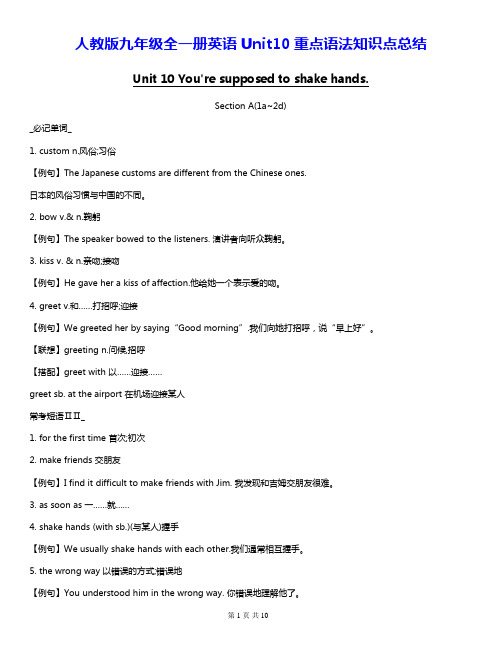
人教版九年级全一册英语Unit10重点语法知识点总结Unit 10 You're supposed to shake hands.Section A(1a~2d)_必记单词_1. custom n.风俗;习俗【例句】The Japanese customs are different from the Chinese ones.日本的风俗习惯与中国的不同。
2. bow v.& n.鞠躬【例句】The speaker bowed to the listeners. 演讲者向听众鞠躬。
3. kiss v. & n.亲吻;接吻【例句】He gave her a kiss of affection.他给她一个表示爱的吻。
4. greet v.和……打招呼;迎接【例句】We greeted her by saying“Good morning”.我们向她打招呼,说“早上好”。
【联想】greeting n.问候,招呼【搭配】greet with 以……迎接……greet sb. at the airport 在机场迎接某人常考短语ⅡⅡ_1. for the first time 首次;初次2. make friends 交朋友【例句】I find it difficult to make friends with Jim. 我发现和吉姆交朋友很难。
3. as soon as 一……就……4. shake hands (with sb.)(与某人)握手【例句】We usually shake hands with each other.我们通常相互握手。
5. the wrong way 以错误的方式;错误地【例句】You understood him in the wrong way. 你错误地理解他了。
6. hold out 伸出(手等)7. greet each other 互相问候8. to one’s surprise 令某人惊讶的是经典句型ⅢⅡ1. That's how people in Japan are expected to greet each other.那就是在日本人们互相问候的方式。
人教版九年级英语第十单元知识点

1. You are supposed to shake hands.be supposed to do…应该……被期望做……,当句子的主语是人时,它可以用来表示劝告,建议,义务,责任等,意思是“to be expected to do sth., or to have to do sth.”“(按规定、习惯、安排等)应该做某事,可用来表示劝告、建议、义务、责任等,相当于should的用法。
否定形式为“be not supposed to do sth.”表示不该或禁止做的情。
e.g. If you want to eat ice-cream, you are supposed to ask you mum. 如果你想吃冰淇淋,应该先问问你妈妈。
e.g. You’re supposed to ask the teacher if you want to leave the classroom.如果你要离开教室,应该先问问老师。
We are not to supposed to play football on Sunday. 不准我们在星期日踢足球。
2. That’s how people in Japan are expected to greet each other.greet =to welcome or say “hello”动词“问候,打招呼”e.g. He greeted her by saying “good morning”. 他向她打招呼说“早上好”。
She greeted me with a friendly smile. 她向我微笑致意。
be expected to表达“被期许(预期)会做某事, 希望做某事,表示一种可能性。
e.g. She was expected to arrive before dinner. 希望她晚餐前到达。
be supposed to do相对于be expected to do主观性更强一些。
Unit10笔记人教版英语九年级全册

Unit 10 知识梳理总结【词汇梳理】greet(v.和......打招呼;迎接)→ greeting (n. )relax(v.放松;休息)→ relaxed (adj. 放松的;自在的)→ relaxing (adj. 令人放松的)value(n.价值)→valuable(adj.贵重的;宝贵的)→ be of great value很有价值north(n.北;北方;adv.朝北;向北)→northern(adj.北方的;北部的)east(n.东;东方;adv.朝东;向东)→eastern(adj.东方的;东部的)behave(v.表现;举止)→ behavior (n. 行为;举止;态度)→wellbehaved表现好的suggest(v.建议)→ suggestion (n. 建议)drop by(顺便拜访)→ dropped(过去式;过去分词)【短语归纳】shake hands握手be supposed to do 应该做某事for the first time首次;第一次make mistakes犯错误as soon as 一......就...... hold out伸出to one’s surprise令某人惊讶的是find out查明;弄清(情况)the capital of... ......的首都at noon在中午be/get mad at/with sb. 对某人很生气drop by顺便拜访;随便进入as...as sb. can/could某人尽可能...... on time准时after all毕竟;终归get mad大动肝火;气愤make an effort做出努力big deal重要的事;大人物on/at the coast在海边knock on/at the door敲门table manners餐桌礼仪take off脱下(衣服);(飞机)起飞be worth doing值得做...... stick sth. into将某物插入point at指向go out of one’s way特地;格外努力make sb. feel at home使某人感到宾至如归be excited about... 对......感到兴奋look forward to+doing 期望做某事show up出现;露面【考点总结】1.You’re supposed to shake hands.be supposed to 应该,相当于shoulde.g.We are supposed to help each other.=We should help each other.【注】suppose意为“认为;推断”时,其后常接宾语从句,在宾语从句中否定要前移。
人教版九年级英语第十单元知识点总结(推荐文档).doc
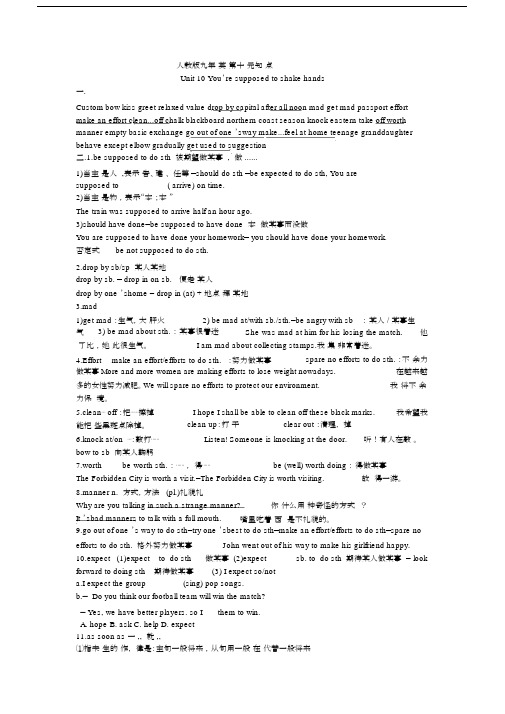
人教版九年英第十元知点Unit 10 You’re supposed to shake hands一.Custom bow kiss greet relaxed value drop by capital after all noon mad get mad passport effort make an effort clean...off chalk blackboard northern coast season knock eastern take off worth manner empty basic exchange go out of one ’sway make...feel at home teenage granddaughter behave except elbow gradually get used to suggestion二.1.be supposed to do sth 被期望做某事 ,做 ......1)当主是人 ,表示告、建、任等 =should do sth =be expected to do sth, You aresupposed to___________( arrive) on time.2)当主是物,表示“本;本”The train was supposed to arrive half an hour ago.3)should have done=be supposed to have done 本做某事而没做You are supposed to have done your homework= you should have done your homework.否定式be not supposed to do sth.2.drop by sb/sp 某人某地drop by sb. = drop in on sb. 便走某人drop by one ’shome = drop in (at) + 地点拜某地3.mad1)get mad :生气,大肝火2) be mad at/with sb./sth.=be angry with sb :某人 / 某事生气3) be mad about sth. :某事很着迷She was mad at him for his losing the match. 他了比,她此很生气。
人教版九年级全一册英语Unit10单元语法知识点总结

人教版九年级全一册英语Unit10单元语法知识点总结本单元重点短语的具体用法1. be supposed to do sth:表示“应该做某事”,例如:You are supposed to finish your homework before playing games.(你应该在玩游戏之前完成作业。
)2. be expected to do sth:意思是“应该/被期望做某事”,如:Students are expected to obey the school rules.(学生应该遵守校规。
)3. shake hands (with…):用于“(和……)握手”,比如:He shook hands with the guest politely.(他礼貌地和客人握手。
)4. bow to sb:意为“向某人鞠躬”,例如:We should bow to the old.(我们应该向老人鞠躬。
)5. for the first time:表示“首次,第一次”,如:I saw the sea for the first time.(我第一次看到了大海。
)6. people in Korea:指“韩国的人们”,例如:People in Korea like to eat kimchi.(韩国的人们喜欢吃泡菜。
)7. greet sb. (in) the wrong way:意思是“以错误的方式问候某人”,例如:You shouldn't greet others in the wrong way.(你不应该以错误的方式问候他人。
)8. be invited to sw.:表示“被邀请去……”,例如:I was invited to the party.(我被邀请参加了聚会。
)9. be invited to do sth.:意思是“被邀请做……”,如:She was invited to speak at the conference.(她被邀请在会议上发言。
人教版新目标英语九年级-Unit10单元知识点小结
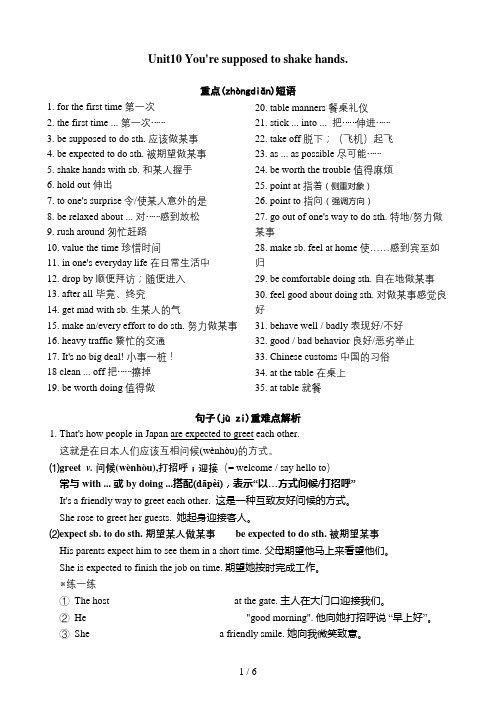
Unit10 You're supposed to shake hands.重点(zh òngdi ǎn)短语句子(j ù zi)重难点解析 1. That's how people in Japan are expected to greet each other.这就是在日本人们应该互相问候(wènhòu)的方式。
⑴greet v. 问候(wènhòu),打招呼;迎接(= welcome / say hello to )常与with ... 或by doing ...搭配(dāpèi),表示“以…方式问候/打招呼”It's a friendly way to greet each other. 这是一种互致友好问候的方式。
She rose to greet her guests. 她起身迎接客人。
⑵expect sb. to do sth. 期望某人做某事 be expected to do sth. 被期望某事His parents expect him to see them in a short time. 父母期望他马上来看望他们。
She is expected to finish the job on time. 期望她按时完成工作。
※练一练① The host ________________________ at the gate. 主人在大门口迎接我们。
② He _______________________________ "good morning". 他向她打招呼说 “早上好”。
③ She _________________________ a friendly smile. 她向我微笑致意。
1. for the first time 第一次2. the first time ... 第一次……3. be supposed to do sth. 应该做某事4. be expected to do sth. 被期望做某事5. shake hands with sb. 和某人握手6. hold out 伸出7. to one's surprise 令/使某人意外的是8. be relaxed about ... 对……感到放松9. rush around 匆忙赶路10. value the time 珍惜时间11. in one's everyday life 在日常生活中12. drop by 顺便拜访;随便进入13. after all 毕竟、终究14. get mad with sb. 生某人的气15. make an/every effort to do sth. 努力做某事16. heavy traffic 繁忙的交通17. It's no big deal! 小事一桩!18 clean ... off 把……擦掉19. be worth doing 值得做20. table manners 餐桌礼仪 21. stick ... into ... 把……伸进…… 22. take off 脱下;(飞机)起飞 23. as ... as possible 尽可能…… 24. be worth the trouble 值得麻烦 25. point at 指着(侧重对象) 26. point to 指向(强调方向) 27. go out of one's way to do sth. 特地/努力做某事 28. make sb. feel at home 使……感到宾至如归 29. be comfortable doing sth. 自在地做某事 30. feel good about doing sth. 对做某事感觉良好 31. behave well / badly 表现好/不好 32. good / bad behavior 良好/恶劣举止 33. Chinese customs 中国的习俗 34. at the table 在桌上 35. at table 就餐 36. show up 出现;显现;赶到;使……出丑2. Where I'm from, we are pretty relaxed about time. 我来的那个地方(dìfāng)对时间非常放松。
人教版九年级英语unit10知识总结
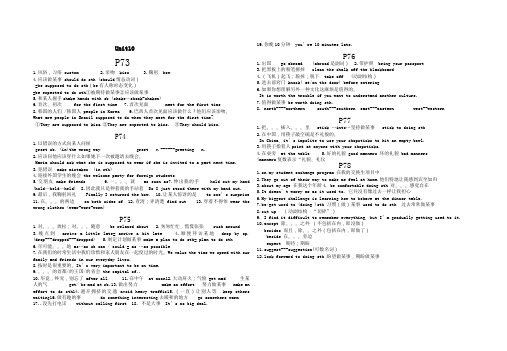
Unit10P731.风俗,习俗 custom2.亲吻 kiss3.鞠躬 bow4.应该做某事 should do sth (should 情态动词) =be supposed to do sth (be 有人称时态变化)=be expected to do sth①被期待做某事②应该做某事5.和某人握手shake hands with sb (shake —shook-shaken)6.首次、初次 for the first time7.首次见面 meet for the first time8.韩国的人们 /韩国人 people in Korea 9.巴西人首次见面应该做什么?他们应该亲吻。
What are people in Brazil supposed to do when they meet for the first time? ①They are supposed to kiss.②They are expected to kiss. ③They should kiss.P741.以错误的方式向某人问候greet sb. (in)the wrong way greet v.------greeting n. 2.应该问他应该穿什么如果她下一次被邀请去晚会。
Maria should ask what she is supposed to wear if she is invited to a part next time. 3.犯错误 make mistakes (in sth)4.迎接外国学生的晚会 the welcome party for foreign students5.交朋友 make friends6.一。
就 as soon as7.伸出我的手 hold out my hand(hold —held —held) 8.因此我只是伸着我的手站着 So I just stood there with my hand out.9.最后,我鞠躬回礼 Finally I returned the bow. 10.让某人惊讶的是 to one’s surprise11.在。
人教版九年级英语Unit10单元知识点梳理

Unit 10 You're supposed to shake hands.一、短语:1.be supposed to do sth应该做…2.be expected to do sth.应该/被期望做…3.shake hands(with…)(和…)握手4.bow to sb.向某人鞠躬5.for the first time首次,第一次6.people in Korea韩国的人们7.greet sb.(in)the wrong way以错误的方式问候某人8.be invited to sw.被邀请去…...9.be invited to do sth.被邀请做…10.welcome party欢迎会11.as soon as一…就…...(引导时间状从)12.as soon as sb can尽可能快的......13.hold out(my hands)伸出(我的手)14.on both sides of my face在我的两个脸颊上15.be from=come from来自16.be relaxed about对…放松/随意17.a bit/little late晚一点18.value the time we spend with sb珍惜我们与某人度过的时间19.in our everyday lives在我们的日常生活中20.drop by顺便拜访,随便进入21.make plans(to do sth.)计划做某事22.plan to do sth.计划做某事23.on the side of the face在脸的一侧24.the town center在城镇中心25.as many as sb can=as many as possible尽可能多的…26.be on time守时27.the capital of clocks and watches钟表之都28.after all毕竟,终归29.at noon在中午30.15 minutes late迟到15分钟二、重点句子:1.Where I’m from,we’re pretty relaxed about time.我所在的地方,对时间是相当宽松的。
人教版英语九年级知识点总结Unit10
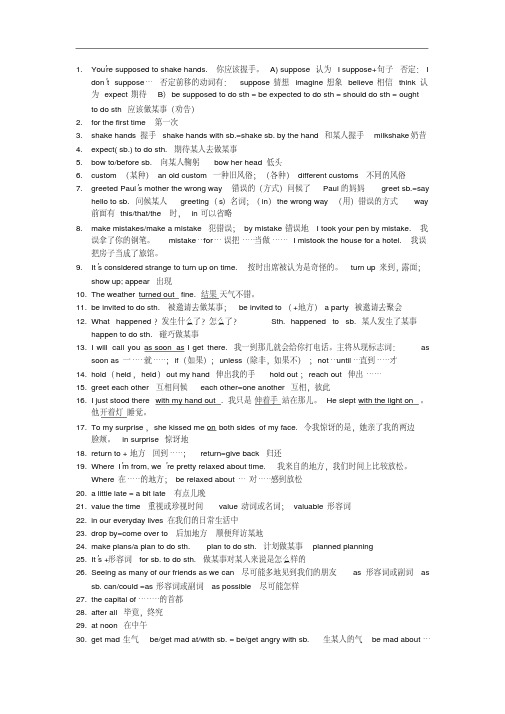
1.You’re supposed to shake hands. 你应该握手。
A) suppose 认为I suppose+句子否定:Idon’t suppose…否定前移的动词有:suppose猜想imagine想象believe相信think认为expect期待B)be supposed to do sth = be expected to do sth = should do sth = ought to do sth 应该做某事(劝告)2.for the first time 第一次3.shake hands 握手shake hands with sb.=shake sb. by the hand 和某人握手milkshake奶昔4.expect( sb.) to do sth. 期待某人去做某事5.bow to/before sb. 向某人鞠躬bow her head低头6.custom (某种)an old custom 一种旧风俗;(各种)different customs 不同的风俗7.greeted Paul’s mother the wrong way 错误的(方式)问候了Paul的妈妈greet sb.=sayhello to sb. 问候某人greeting(s)名词;(in)the wrong way (用)错误的方式way 前面有this/that/the时,in可以省略8.make mistakes/make a mistake 犯错误;by mistake错误地I took your pen by mistake. 我误拿了你的钢笔。
mistake…for…误把……当做……I mistook the house for a hotel. 我误把房子当成了旅馆。
9.It’s considered strange to turn up on time. 按时出席被认为是奇怪的。
人教版九年级英语unit10知识点

人教版九年级英语unit10知识点人教版九年级英语unit10知识1知识梳理【重点】besupposedtodosth应该做…beexpectedtodosth.应该/被期望做…shakehands(with…)(和…)握手bowtosb.向某人鞠躬forthefirsttime首次,第一次peopleinKorea韩国的人们greetsb.(in)thewrongway以错误的方式问候某人beinvitedtosw.被邀请去…...assoonas一…就…(引导时间状从)assoonassbcan尽可能快的......holdout(myhands)伸出(我的手)onbothsidesofmyface在我的两个脸颊上berelaxedabout对…放松/随意abit/littlelate晚一点valuethetimewespendwithsb珍惜我们与某人度过的时间19.inoureverydaylives在我们的日常生活中dropby顺便,随便进入makeplans(todosth.)计划做某事plantodosth.计划做某事onthesideoftheface在脸的一侧thetowncenter在城镇中心asmanyassbcan=asmanyaspossible尽可能多的…beontime守时thecapitalofclocksandwatches钟表之都afterall毕竟,终归atnoon在中午15minuteslate迟到15分钟【重点句型】Heshouldhavetoldmeaboutit.他本应该把这件事告诉我。
WhereI’mfrom,we’reprettyrelaxedabouttime.我所在的地方,对时间是相当宽松的。
Weoftenjustdropbyourfriends’homes.我们时常去朋友家拜访。
Oftenwejustwalkaroundthetowncenter,seeingasmanyofourfriendsaswecan.我们经常走遍市中心,看尽可能多的朋友。
人教版九年级英语unit10知识归纳

【短语归纳】1. be supposed to do=be expected to do=should do被期望做,应该expect/wish/hope to do希望/盼望做某事expect/wish/hope + that 从句expect/wish sb. to do2. shake hands 握手3. for the first time 第一次4. table manners 餐桌礼仪5. drop by/in=come over 偶然拜访,顺便拜访dropped droppingrain drop 雨滴 a drop of water 一滴水6. after all 毕竟,终究7. be on time 准时in time 及时By the time I got to school, the teacher had begun to have class. By the end of last term, we had learned 3000 words.at times=from time to time=sometimes=once in a while 有时sometimes 有时some times 几次sometime 某时some time 一段时间for the first time第一次8. (in)the wrong way 以错误的方式(in)the right way 以正确的方式9. be relaxed about 对……比较随意be serious about对……是认真的be worried about对……感到担忧的be anxious about对……感到焦虑的be nervous about对……感到紧张的be excited about 对…感到兴奋地be careful about10. a bit/a little/a little bit/kind of+ adj./adv. 一点,几分a little/a bit of + Ua few+Cs11. He should have told me about it. 他本应该把这件事告诉我。
人教版九年级英语Unit 10知识点总结

九年级英语Unit 10 You’re supposed to shake hands 讲义一、词性转换Section A1. greet → (n.) greeting2. relaxed → (v.) relax3. value → (adj.) valuable4. mad → (n.) madness5. northern → (n.) north6. eastern – (n.) eastSection B7. basic → (n) base8. gradually→ (adj.) gradual9. suggestion → (v.) suggest二短语归纳1. shake hands 握手2. for the first time 第一次;首次3. be expected to 被期望4. arrive at 到达5. make mistakes 犯错误6. as soon as 一……就……7. hold out 伸出8. greet each other 相互打招呼9. to one’s surprise 使某人吃惊的是10. on both sides of 在……的两边11. find out 查明;弄清12. everyday lives 日常生活13. drop by 顺便访问;随便进入14. make plans to do sth. 计划做某事15. on time 准时16. after all 毕竟;终归17. get mad 大动肝火;气愤18. make an effort 作出努力19. no big deal 没什么大事20. clean…off 把……擦掉21. take of 脱下(衣服);(飞机等)起飞22. point at 指向;对准23. student exchange program交换生项目24. go out of one’s way 特地;格外努力25. make…feel at home 使(某人)感到宾至如归26. because of 由于27. cut up 切碎28. get used to 习惯于29. be excited about 对……感到兴奋30. look forward to doing sth.盼望做某事31. show up 出现三.句型集萃1. be supposed to do sth.应该做某事2. be expected to do sth. 被期望应该做某事3. It’s impolite if you… 如果你……是不礼貌的4. I wouldn’t mind that! 我不会介意这个5. It’s + adj. + for sb. to do sth 某人做某事是……的6. v. + as + adj + as + sb. can 尽可能……做某事7. It is + adj. + to do sth. 做某事是……的8. keep sb. waiting 让某人等待五、重点句子1. That’s how people in Japan are expected to greet each other. 那是人们在日本彼此打招呼应该做的。
九年级人教版英语unit10知识点
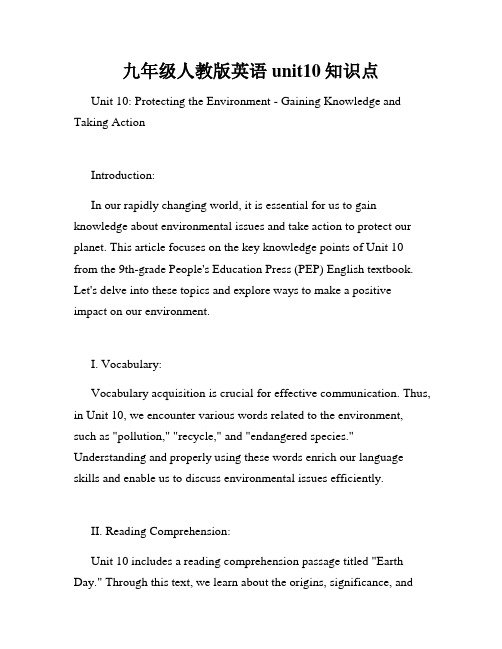
九年级人教版英语unit10知识点Unit 10: Protecting the Environment - Gaining Knowledge and Taking ActionIntroduction:In our rapidly changing world, it is essential for us to gain knowledge about environmental issues and take action to protect our planet. This article focuses on the key knowledge points of Unit 10 from the 9th-grade People's Education Press (PEP) English textbook. Let's delve into these topics and explore ways to make a positive impact on our environment.I. Vocabulary:Vocabulary acquisition is crucial for effective communication. Thus, in Unit 10, we encounter various words related to the environment, such as "pollution," "recycle," and "endangered species." Understanding and properly using these words enrich our language skills and enable us to discuss environmental issues efficiently.II. Reading Comprehension:Unit 10 includes a reading comprehension passage titled "Earth Day." Through this text, we learn about the origins, significance, andactivities associated with Earth Day. This passage emphasizes the importance of this annual event in raising awareness and encouraging environmental action. By comprehending and analyzing such texts, we gain insight into environmental campaigns and learn how to protect and preserve our surroundings.III. Listening Skills:Listening comprehensively is a vital component of language learning. In Unit 10, we improve our listening skills by engaging with audio materials related to protecting the environment. By actively listening and responding to dialogues and monologues, we can better understand environmental problems and solutions, such as reducing carbon emissions, conserving water, and promoting clean energy.IV. Grammar:Proper grammar usage enables us to express our ideas accurately. In this unit, we focus on learning the present perfect tense, which helps us discuss past actions and their ongoing relevance to the present. This tense is particularly useful when discussing environmental issues, as it allows us to link past actions to current consequences and motivate us to take action to rectify the damage caused.V. Writing Skills:Writing is a powerful tool for expressing our thoughts and ideas. In Unit 10, we hone our writing skills by composing environmentally focused essays, letters, and speeches. By organizing our thoughts and presenting them coherently, we can effectively convey the importance of environmental protection and inspire others to join us in making a positive impact.VI. Speaking Practice:Effective verbal communication is essential in conveying messages and ideas. Unit 10 provides opportunities for us to practice speaking skills through group discussions, role-plays, and presentations centered around environmental issues. By participating actively and sharing our opinions, we not only improve our speaking abilities but also learn to collaborate with others in finding sustainable solutions.Conclusion:Unit 10 of the 9th-grade PEP English textbook offers valuable knowledge and skills related to environmental protection. By acquiring a robust vocabulary, honing our reading comprehension, listening, grammar, writing, and speaking abilities, we become better equipped to address environmental challenges. Let us apply this knowledge in our daily lives and take responsibility for protecting our planet, ensuring a sustainable future for generations to come.。
人教版英语九全单元unit 10 知识点
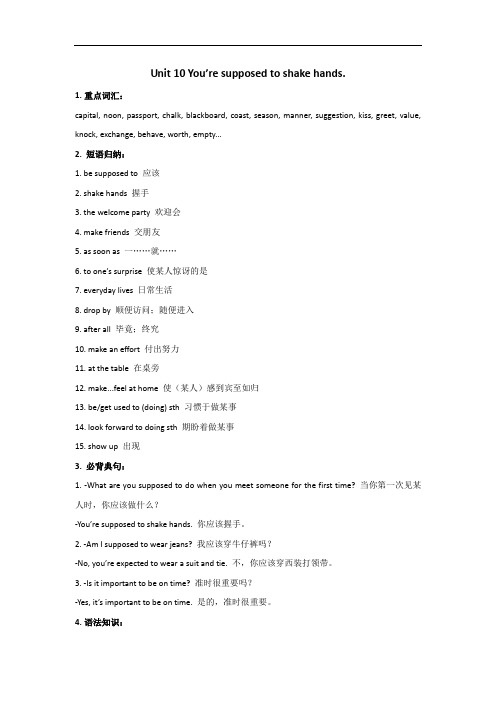
Unit 10 You’re supposed to shake hands.1.重点词汇:capital, noon, passport, chalk, blackboard, coast, season, manner, suggestion, kiss, greet, value, knock, exchange, behave, worth, empty...2. 短语归纳:1. be supposed to 应该2. shake hands 握手3. the welcome party 欢迎会4. make friends 交朋友5. as soon as 一……就……6. to one’s surprise 使某人惊讶的是7. everyday lives 日常生活8. drop by 顺便访问;随便进入9. after all 毕竟;终究10. make an effort 付出努力11. at the table 在桌旁12. make...feel at home 使(某人)感到宾至如归13. be/get used to (doing) sth 习惯于做某事14. look forward to doing sth 期盼着做某事15. show up 出现3. 必背典句:1. -What are you supposed to do when you meet someone for the first time? 当你第一次见某人时,你应该做什么?-You’re supposed to shake hands. 你应该握手。
2. -Am I supposed to wear jeans? 我应该穿牛仔裤吗?-No, you’re expected to wear a suit and tie. 不,你应该穿西装打领带。
3. -Is it important to be on time? 准时很重要吗?-Yes, it’s important to be on time. 是的,准时很重要。
人教九年级unit10知识点
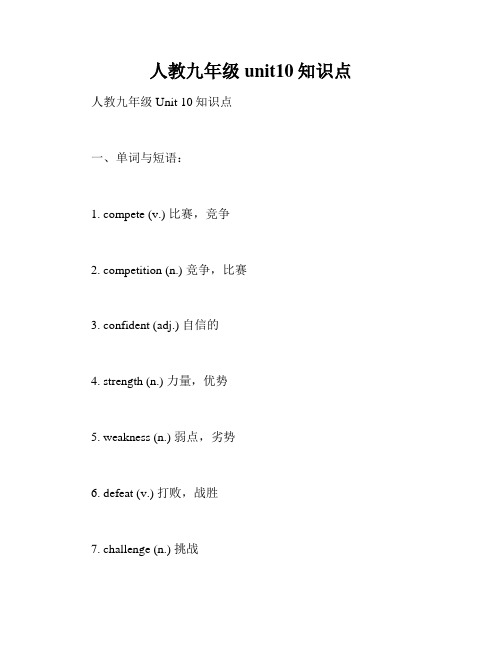
人教九年级unit10知识点人教九年级Unit 10知识点一、单词与短语:1. compete (v.) 比赛,竞争2. competition (n.) 竞争,比赛3. confident (adj.) 自信的4. strength (n.) 力量,优势5. weakness (n.) 弱点,劣势6. defeat (v.) 打败,战胜7. challenge (n.) 挑战8. nervous (adj.) 紧张的,焦虑的9. overtake (v.) 超过,超越10. advertisement (n.) 广告11. effective (adj.) 有效的,有影响的12. professional (adj.) 职业的13. impressive (adj.) 令人印象深刻的14. logical (adj.) 合乎逻辑的15. misunderstanding (n.) 误解16. arrangement (n.) 安排,布置17. cooperate (v.) 合作18. considerate (adj.) 体贴的19. responsible (adj.) 负责任的20. grateful (adj.) 感激的二、语法与句型:1. 定语从句:定语从句用来修饰或限制一个名词,通常由关系代词who, whom, whose, that, which引导。
例句:The girl who is sitting next to me is my best friend.坐在我旁边的女孩是我最好的朋友。
2. 状语从句:状语从句用来表示时间、原因、条件、结果等,通常由从属连词when, because, if, so等引导。
例句:I will go to the park if it doesn't rain tomorrow.如果明天不下雨,我会去公园。
3. 动词不定式:不定式用来表示目的、结果、原因、条件等,通常由to + 动词原形构成。
- 1、下载文档前请自行甄别文档内容的完整性,平台不提供额外的编辑、内容补充、找答案等附加服务。
- 2、"仅部分预览"的文档,不可在线预览部分如存在完整性等问题,可反馈申请退款(可完整预览的文档不适用该条件!)。
- 3、如文档侵犯您的权益,请联系客服反馈,我们会尽快为您处理(人工客服工作时间:9:00-18:30)。
Unit 10 You一、词性转换Section A1. greet f n.) greeting2. relaxed f Q) relax3. value f (adj.) valuable二短语归纳1. shake hands 握手2. for the first time 第一次;首次3. be expected to 被期望4. arrive at 到达5. make mistakes 犯错误6. as soon as 一 就 ..7. hold out 伸出8. greet each other 相互打招呼9. to one ’ s surprise 使某人吃惊的是10. on both sides of 在 .. 的两边11. find out 查明;弄清 Section B7. basic f (n) base8. gradually f adj.) gradual9. suggestion f (v.) suggest24. go out of one ' s way 特地;格外努力25. make- • • feel at home 使(某 人)感到宾至如归26. because of 由于 27. cut up 切碎 28. get used to 习惯于 29. be excited about 对 .. 感到兴奋30. look forward to doing sth.盼望做某事31. show up 出现三.句型集萃1. be supposed to do sth. 应该做某事2. be expected to do sth. 被期望应该做某事3. It ' s impolite if you 如果你 是不礼貌的4. I wouldn ' t mind that!我不会介意这个5. It ' s + adj. + for sb. to do sth 某人做某事是的6. v. + as + adj + as + sb. can 尽可能 做某事7. It is + adj. + to do sth. 做某事是 的8. keep sb. waiting 让某人等待五、重点句九年级英语re supposed to shake hands4. mad f ( n.) madness5. northern fn(.) north12. everyday lives 日常生活 13. drop by 顺便访问; 随便进入14. make plans to do sth.计划做某事15. on time 准时 16. after all 毕竟;终归 17. get mad 大动肝火;气愤 18. make an effort 作出努力 19. no big deal 没什么大事 20. clean …off 把 .. 擦掉 21. take of 脱下(衣服) ;(飞机等)起飞22. point at 指向;对准1. That ’ s how people in Japan are expected to greet each other. 那是人们在日本彼此打招呼应该做的。
①2. I held out my hand and to my surprise, she kissed me on both sides of my face! 我伸出手,令我吃惊的是,她亲了我的双侧脸颊!We value the time we spend with our family and friends in our everyday lives. 我们珍惜我们和家人、朋友在每天的生活中一起度过的时光。
4. We ’ re the capital of clocks and watches, after all! 毕竟我们是钟表之都after all 毕竟,终究★5. If you ’ re even 15 minutes late, your friends may get mad. 如果你甚至晚了十五分 钟,你的朋友可能会发疯。
6. So I make an effort to be on time when I meet my friends. 所以当我见朋友时,我要尽全力准时。
7. …it is worth the trouble if you want to understand another culture. .. 如果想要理解另一种文化,这些麻烦是值得的。
8. How much do you know about table manners around the world?你对世界各地的餐桌礼仪知道多少?9. In Korea, the youngest person is expected to start eating first. 在韩国,最年轻的人应该先开始吃。
10. In China, it ’ s impolite to use your chopsticks to hit an empty bowl. 在中国,用筷敲空碗是不礼貌的。
11. They go out of the their way to make me feel at home. 束。
12. Another example is you ’ re not supposed to eat anything with your hands except bread,not even fruit. 另一个例是,除了面包以外,你不应该用手吃任何东西,甚至水果也不行。
13. I have to say that I find it difficult to remember everything, but I ’ mgradually3. 他们想方设法让我感到不拘getting used to it. 我不得不说,我觉得要把这一切记住很难,但我正在逐渐适应。
四、语法be supposed to do sth. 结构的用法1.总述:be supposed to do sth.(被动结构)意为“应该,理应,有..... 义务,被期望要求做某事”,to 是动词不定式符号,不是介词,其后要跟动词原形。
You are supposed to know the law. 你应该懂得这项法令。
We are supposed to get there at nine. 我们应该9 点到那儿。
2.变化形式:否定形式是在be 动词后加否定副词not,此时相当于be not allowed to do ,意为“不被许可做,不应该做”。
疑问形式需将be 动词的相应形式提到主语前。
We are not supposed to play football in the street. 我们不应该在大街上踢足球。
Is he supposed to get there at five? 他应该在 5 点钟到那儿吗?3.拓展:① 当be supposed to……的主语是物时,它意为“本应,本该” ,用于表示“某事本应该发生而没有发生”。
The train was supposed to arrive half an hour ago. 火车本应在半小时之前到达。
②be supposed to be 有“某人/某事被认为 .... "的意思,其主动形式为" suppose sb. tobe + 形容词/名词”。
All thse classmates suppose him to be stupid (= He is supposed to be stupid by all the classmate). But in fact, he is a good student.专项训练1.【2017 山东枣庄】In France you ___ put bread on the table. You are notsupposed to put it on the plate.A. shouldn ’tB. are supposed toC. would like to D .will2.You were _____ t o close the windows. Why were you so careless?A. allowedB. believedC. supposedD. caused3.In China, you are not supposed _y our bowl of rice.A. to pick upB. picking upC. to pick outD.to pick off4.You should have asked __________ .A. what are you supposed to wearB. what you are supposed towearC. What you are suppose to wearD. what you suppose to wear5.Students are ____ to speak loudly in the reading room.A. toldB. supposeC. not supposedD.allowed。
